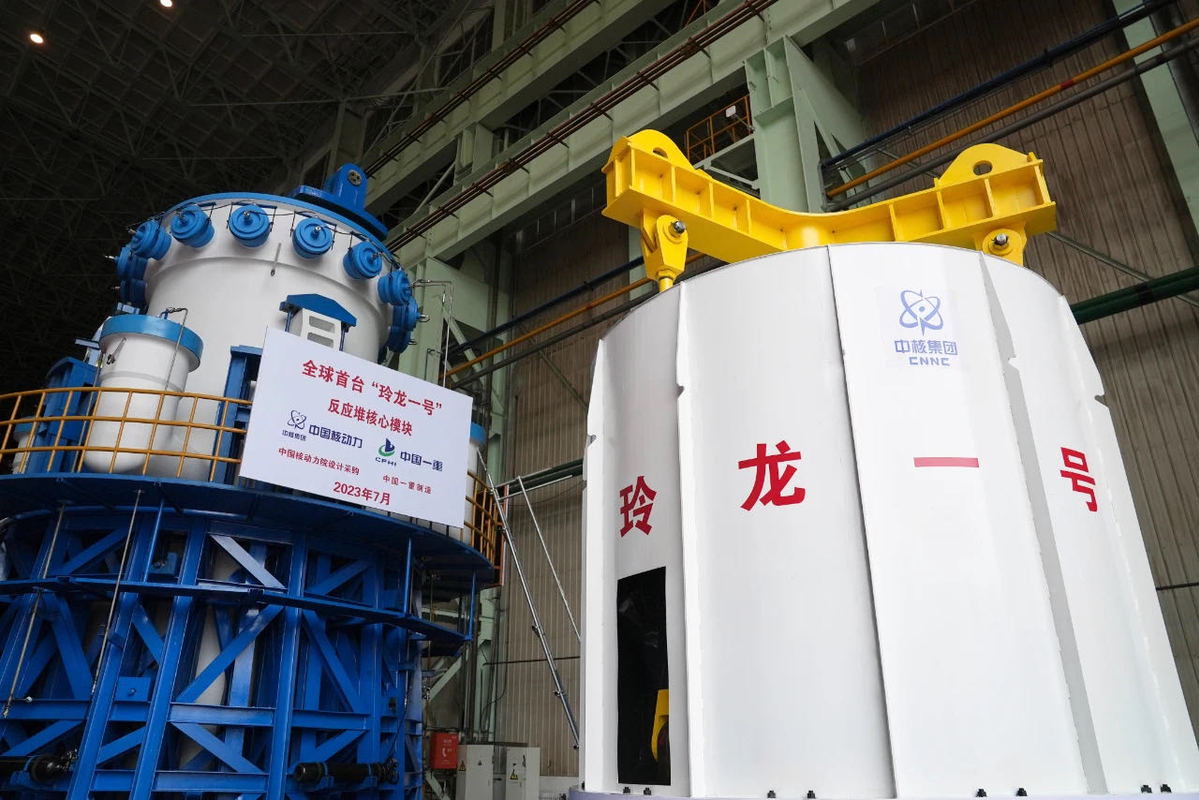
The core module of the Linglong One — the world's first commercial small modular reactor — was unloaded at the Changjiang Nuclear Power Plant dock in Hainan province on Thursday morning.
The core module cleared its factory acceptance test on July 13 in Dalian, Liaoning province, marking a breakthrough in the technological innovation of small modular reactors in China. The development brought China's nuclear power technology and its capability to construct nuclear power facilities to the global forefront, China Central Television reported.
Sun Hua, assistant to the general manager of Hainan Nuclear Power Co, affiliated with the China National Nuclear Corp, referred to the core module as the "small, movable charger of the nuclear power plant". It is the most advanced key equipment of the reactor and integrates pressure vessels, evaporators and other components.
"Small as it is, the integrated core module of the reactor has all its vital components," said Song Danrong, chief designer of the Linglong One, a multipurpose small modular pressurized water reactor self-developed by the corporation.
If the previous large reactor is likened to a desktop computer, which includes a central processing unit, a monitor and a keyboard, the latest small modular reactor can be regarded as a laptop with all its components integrated into one unit, he said.
"When we receive the integrated core module, all we need to do before installation is conduct a hydraulic pressure test, because welding and prefabrication of its components were already done in a factory. It will save us a lot of time in building the Linglong One," said Chen Jianxin, chief engineer of Hainan Nuclear Power Co.
The Linglong One, developed with independent intellectual property rights, is the world's first third-generation small modular reactor to pass a safety review conducted by the International Atomic Energy Agency in 2016.
The construction of the reactor started at Changjiang Li autonomous county on July 13, 2021. It is due to enter commercial operation as early as the end of 2025, according to Chen.
Once completed, the Linglong One will be capable of generating 1 billion kilowatt-hours of power annually, enough to meet the electricity needs of 526,000 households. Its annual power generation is equivalent to reducing 880,000 metric tons of carbon dioxide emissions and planting 7.5 million trees.
The reactor will provide clean energy support for Hainan province to build a national ecological civilization pilot zone and a clean energy island, which will help the province take a lead in realizing the country's carbon peak and carbon neutrality goals, according to CCTV.
"Hainan will basically become a free trade port in 2025, and a large number of companies are expected to set up shop in the province. In the future, we can contribute to their use of clean, low-carbon, low-cost, large-capacity and stable nuclear power," Chen said.
Yang Junhua, deputy director of the civil engineering department of Hainan Nuclear Power Co, said that by adopting a sunken design, which means its core module remains underground, the Linglong One "basically avoids the risk of a leakage even if an airplane crashes into the reactor".
With advantages of high safety, short manufacturing cycle, flexible deployment and good engineering and implementation, the small modular reactor can match energy needs in multiple application scenarios such as electricity generation, urban heating, urban cooling, industrial steam production and seawater desalination.
"In the future, the commercial small modular reactor can be used for floating platforms such as nuclear-powered ships. It also has the potential to facilitate China's domestic nuclear power technology to 'go out' to the international market, such as the Middle East and Europe," said Chen, the chief engineer.

